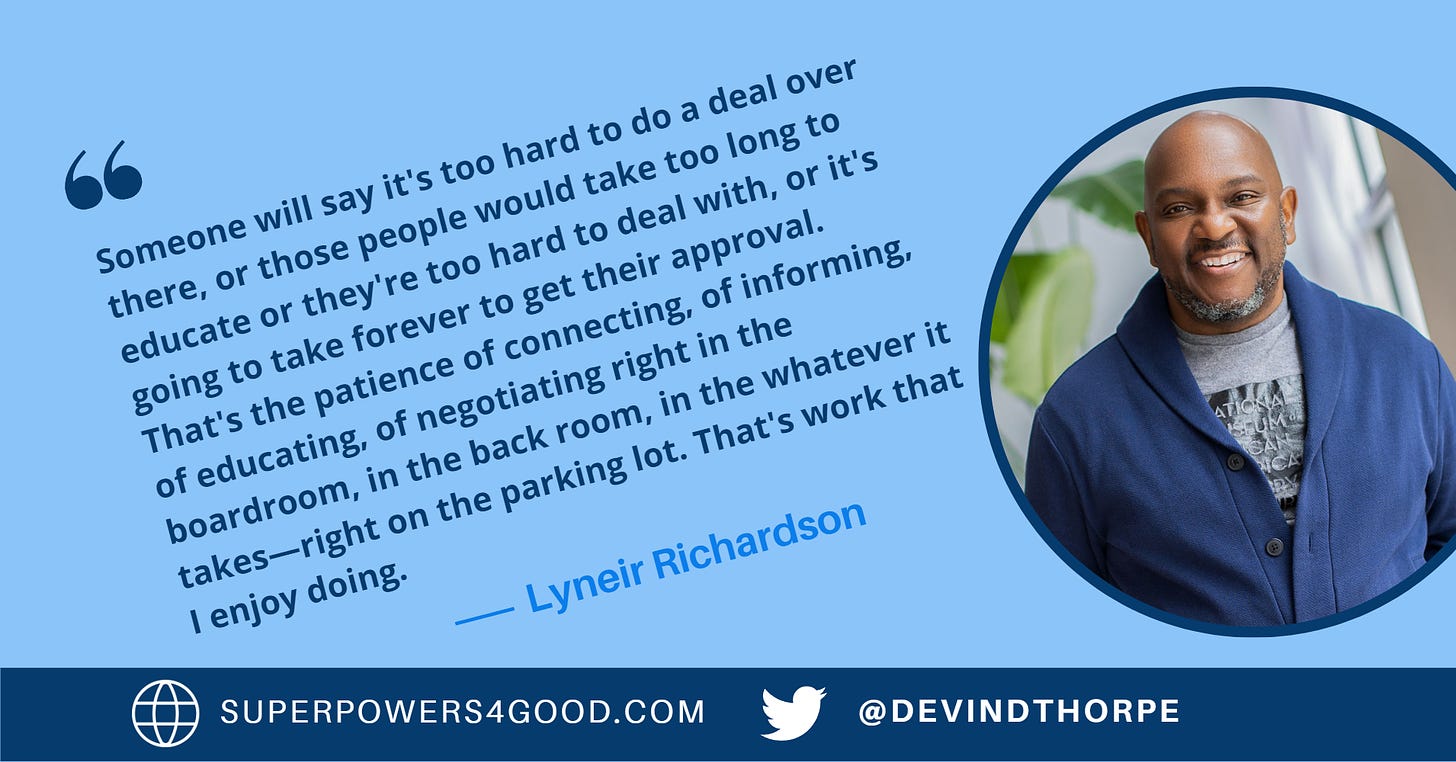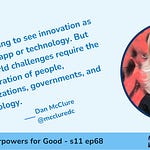Devin: What do you see as your superpower?
Lyneir: Three things: recognizing what it means to fail and understanding all of the, you know, got battle scars and war wounds to show that. The absolute abhorrence of arrogance combined with the patience to see value in people and places. That’s some combination if you want to call that a superpower. That’s what gets me up and gives me energy every day.
I’ve never met a more altruistic real estate developer than Lyneir Richardson. I’m confident he’d be a billionaire if he were only out for himself. His focus is on building communities—Black communities.
Working with philanthropic support from the MacArthur Foundation, the Chicago Community Trust, the Rockefeller Foundation, Surdna Foundation and JP Morgan Chase—among others—Lyneir has built the Chicago TREND Corporation, a for-profit social enterprise.
He focuses on reshaping the commercial real estate in communities, noting that, “Even if the housing is strong, if you see boarded up liquor stores, [vacant] storefronts, multiple dollar stores, check cashing, you have an impression of the neighborhood.”
His effort is to bring community members into the circle of ownership so the full benefits of commercial success accrue to the neighborhood.
In addition to his work at Chicago TREND, he is a professor at Rutgers, where he leads the Center for Urban Entrepreneurship and Economic Development. “We now work with over 800 entrepreneurs who are 70 percent people of color. Over 60 percent are women,” he says. “Our goal is to get them above $1 million of annual recurring revenue.”
“I’m having a lot of fun,” he adds.
“Over the last two years, we’ve bought four shopping centers in partnership with over 130 black, local and small-impact investors,” Lyneir says.
He’s been working on this for three decades, so what some see as a quick success has been a long time coming. “There’s nothing as powerful as an idea whose time has come,” he says.
“Look, even ten years ago, people didn’t talk as intentionally about inclusive economic growth and inclusive economic development,” he says.
The tipping point was a tragedy.
“It took George Floyd to be murdered—in addition to a long list of other people of color—for folks to intentionally, without apology, be able to say, we’ve got to come up with racial wealth gap closing strategies and strategies specifically focused on majority black neighborhoods or creating opportunities for black investors and black entrepreneurs,” Lyneir says.
He calls 2020 “pandemic, protest and political pandemonium.”
He says he reached new clarity in that pandemic year:
One morning there was all this discussion about closing the racial wealth gap, and there was discussion about white guilt. “We see the challenges of systemic inequality and racism in America.”
What hit me like a ton of bricks was wealth is created by owning assets, assets that generate revenue and assets that have the potential to appreciate over time. Maybe those assets have some tax advantages as well.
So, if we're going to close the racial wealth gap, we have to create strategies that help more people of color own assets, whether that's businesses or some type of intellectual property or—I spend a lot of my time around commercial real estate—so owning your home, owning a business, owning commercial property, owning other assets that generate revenue and hopefully appreciate over time.
Investing in strategies that help more people of color own assets and doing that in an investment in a way that says, “Hey, I'm not asking for a grant. I'm not asking to be paying full market rate, but make the neighborhood stronger, come up with a strategy that makes more people owners. If you give me my money back, and there are five less people murdered, and ten more people go to college and life expectancy increases by ten years, boy, I've got a quadruple bottom line. I got my investment, I got an investment return, and I have all these other social impacts.” That's the person that I have been working to connect with individually and institutionally.
As Lyneir works to make this happen, he leverages three different aspects of himself that gel into a single superpower: he understands failure and overcoming it, has the patience to see potential others overlook, and doesn’t tolerate arrogance. Forgive me for assigning this the shorthand “triple combination.”
How to Develop Your Triple Combination As a Superpower
Early in his career, Lyneir learned failure and how to bounce back from it.
I was a young entrepreneur of the year when I was in my 20s, recognized by the SBA, and then miraculously failed. In a fire sale, had to sell my first company. I had to figure out in a year-18 months how I would both keep my reputation and be able to rebuild my career. That wiping out and experiencing both the agony of people’s disrespect but also the subtle grit and confidence that, “Hey I wiped out. But I can come back.”
Over the years, he has also developed patience with people, property and processes others overlook.
Someone will say it's too hard to do a deal over there, or those people would take too long to educate or they're too hard to deal with, or it's going to take forever to get their approval. That's the patience of connecting, of informing, of educating, of negotiating right in the boardroom, in the back room, in the whatever it takes—right on the parking lot. That's work that I enjoy doing.
His aversion to arrogance is something he learned from his mother. “I hate arrogance. My mother used to say, ‘There’s no better or worse. It’s different.’ So anything that feels like arrogance bothers me.”
Bringing these aspects together allows Lyneir to do work others shy away from. He often works with entrepreneurs struggling with businesses trapped in outdated thinking. He doesn’t see his role as being judgmental or critical; he has the patience to be helpful—even when it isn’t fun.
“Economic development is evolutionary, not revolutionary,” he says. “If you stay for the evolution, hopefully, we’ll get to celebrate the revolution at some point.”
He offers advice to entrepreneurs and business leaders:
The optimal innovation has a social impact element and a narrative around solving a problem, making people and places better. But it also has to be profitable, or it has to have a hope of making a profit. It doesn't have to be profitable on day one, but it has to have a hope of making a profit and generating a return on investment over time—at some point to be self-sustaining.
By following Lyneir’s example, you can develop your triple combination into a superpower that enables you to do more good in the world.
Lyneir will be speaking at SuperCrowd23, May 10-11, 2023. Don’t miss it! Superpowers for Good readers can register at half price! Register now!
























Expert: 'Economic Development Is Evolutionary, Not Revolutionary'